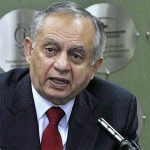KARACHI: Adviser to the Prime Minister on Commerce, Textile, Industry & Production and Investment Abdul Razak Dawood has said though there is economic stabilisation in Pakistan the country has still not seen economic growth.
He was speaking at a talk on ‘Business-Way Forward’ organised by the English Speaking Union of Pakistan at a hotel here on Saturday.
“But there can be no growth without stabilisation,” he pointed out, saying that the challenge for Pakistan is to change from an import consumption country to a country with exports that go up to two hundred million plus.
“We must be able to have at least seven per cent GDP rate for next several years, when Pakistani brands are respected and known to stand for quality and reliability,” he said.ARTICLE CONTINUES AFTER AD
He said that as an import consumption country, Pakistan has been borrowing from the International Monetary Fund (IMF). In the last 30 years, Pakistan has had to borrow 13 times from the IMF. And then the country has also had to agree to IMF’s conditions. “When this government came in, we were losing foreign currency. I was not even certain about economic stability, but I’m an optimist. Things are improving and moving in the right direction,” he said.
Dawood says Pakistanis do not have international vision and that he will give it to them
“I know every country has issues. Like, there were Malaysia and Turkey which had a major crisis, but after reforms their economies are back on the path to recovery,” he said.
“And along with that Pakistan also faces a taxation issue. It is a daunting task. People say to us ‘who are you?’ They say they will not pay their taxes as they did not vote for Imran Khan. What is to be done with all this going on? Should we give up or should we fight back? But we have to be able to turn this country around into a country where all people pay taxes,” he said.
Coming back to trade, he said that there was a need to talk more about exports than imports. “We need an export-led growth. Pakistan is a country where 47 per cent of our revenue is used on imports. We have to bring it down but in order for us to do that we have to pay our taxes,” he said.
“Another big challenge we have faced head on is not talked about that much. For the last 30 to 40 years tariff has become a tool for generating revenue. But we need proper checks and balances here if we want proper governance,” he said, adding that they needed a long-term tariff policy along with a long-term industrial policy and a trade policy.
“We also need to see what are our exports and which countries we need to concentrate on for these exports. We should be able to set ourselves a target. A good trade policy will take us in a good direction. But we also need support in technology, marketing, etc. So business people themselves, be they in textiles, rice, fisheries, meat, poultry or anything else should help in developing policies that can help us move forward. We also have to diversify our exports in multiple sectors,” he said.
He further said that one of the best areas for businessmen is in Karachi.
Talking about gas shortage, he said that it was a challenge. Since demand of gas was very high in winter the supply issue was increasing, he added.
He further said that the world was in an economic recession. “India, our neighbouring country, too, is in recession but I want to congratulate you that the exports of our country are going upwards and in the right direction,” he said.
“A day would come when at least 20 or more Pakistani businesses will be listed in Fortune 500. I dream for Pakistani business houses to span across the globe so much so that in a 24-hour period the sun never sets. The tenacity of our business people is such that we may see this in my lifetime,” he said.
International vision
“Pakistanis do not have international vision; I will give you,” Mr Dawood said while addressing members of the Karachi Chamber of Commerce and Industry.
According to a press release, he said: “We need to leave domestic policy of trade and business.”
He said things were now moving in the right direction. “We are looking forward to promote exports rather than domestic trade,” he added.
Addressing concerns of high duties, gas shortage, transport strike issues of KCCI members, he said: “When I come here, I feel at home. You all know how was the economic conditions of [the] country; we were losing 2 billion dollars, rupee would have been devalued; reserves are going up now.”
“New tariff has been set and will now be part of industrial process under [the] Ministry of commerce,” he said, adding 26 new sectors have been planned and almost completed.
Mr Dawood was invited to KCCI as a chief guest.
Speaking on the occasion, KCCI former presidents A. Khalil and Junaid Esmail Makda, Siraj Kassam Teli and Zubair Motiwala expressed concern over increase in duties, gas shortage and other issues.





